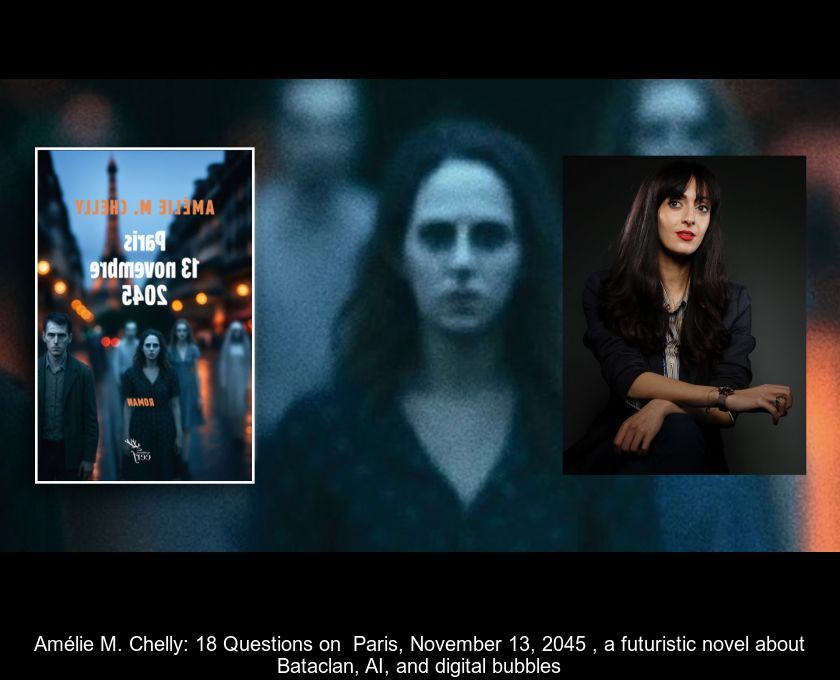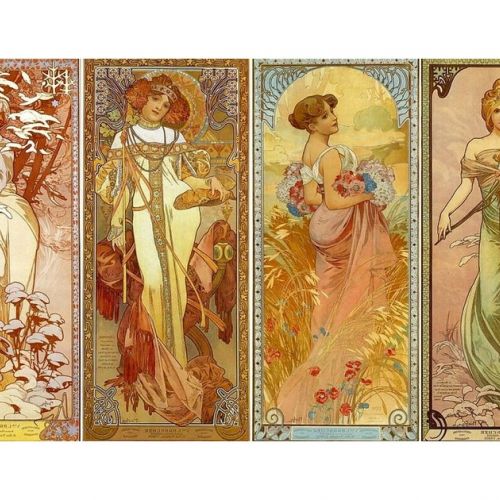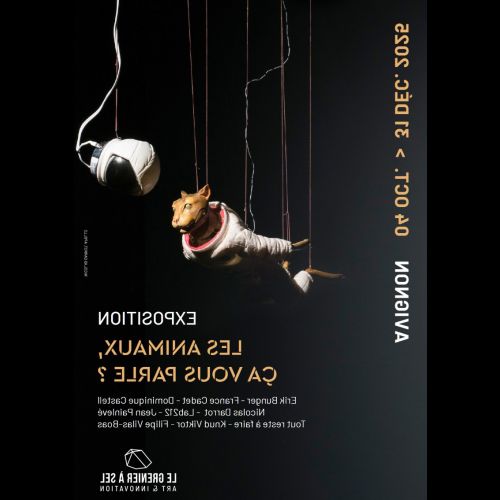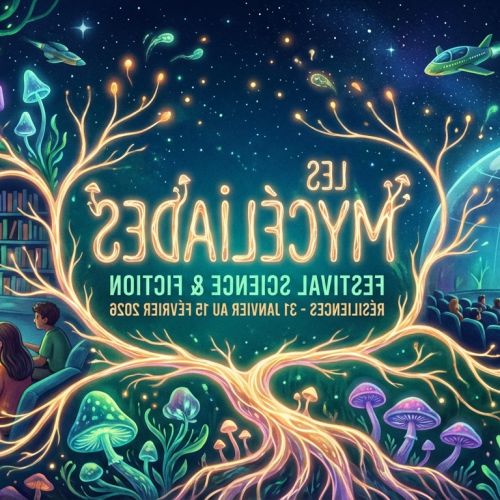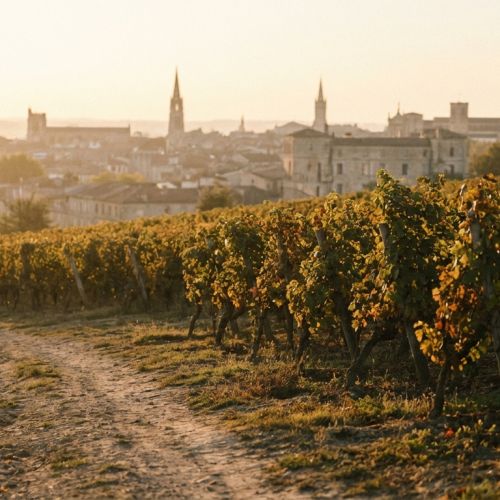Amélie M. Chelly: 18 Questions On 'paris, November 13, 2045', A Futuristic Novel About Bataclan, Ai, And Digital Bubbles
In this interview with 18 questions and answers, Amélie M. Chelly reflects on the genesis of her speculative fiction novel "Paris, November 13, 2045," touching on the memory of the Bataclan, digital bubbles, and AI that writes books. She explores our relationship with reality, terrorism, and coexistence in a future that seems closer than it appears.
Summary
- Writing after November 13th: Why 2045 and How to Work with Memory?
- The Gang of Six: Characters as Seismographs Between the Intimate and Geopolitical
- Paris 2045, AI and Digital Bubbles: A Future Closer Than We Think
- From Iranian Studies to Pop References: Behind the Scenes of the Novel
- How Far Can We Go? Realism, Ethics, and Editorial Gamble
- What's Next? Towards a Saga and Possible Adaptations
Writing After November 13th: Choosing 2045, Processing Trauma, Contemplating Memory
Why 2045 and why this specific November 13th?
2045 isn't really the future; it's an extension of the present, a slightly shifted tomorrow. I chose it because it remains credible: close enough to make us lucid about what there is to fear, yet distant enough for us to still dare hope that things might turn out differently.
Apart from writing, analyzing international relations, especially those in the Middle East, and Islamist organizations is at the core of my activity. This allows me to make realistic projections, which are within the realm of possibility and for some, even probable.
November 13th imposed itself: thirty years after the Paris attacks. The commemorative event constitutes an important juncture in the story: a group of Parisian friends includes among them a survivor of the Bataclan who makes it a point of honor to participate, each year, in the ceremonies paying tribute to the deceased.
How do you write the fiction of a collective trauma without sensationalizing it?
Excellent question! The more pages you allow yourself, the less you put on a show... if you take the necessary precautions, of course! Entering the intimacy of a survivor's mind, observing the evolution of the perception of the traumatic event, showing the transformation, over time, of their relationship to others and to the world, precisely allows us to avoid the spectacular. Spectacle is the display of a finished product, without explanation of the preparations backstage. It's a means that only aims for emotion, immediacy, passion. If one writes the fiction of an event that echoes a collective trauma, associating it with a simple, lucid, but detailed explanation of its mechanisms, one does not seek theatricality. Rather, it contributes not to the artifice of spectacle, but to our understanding of the misfortunes humanity inflicts upon itself. Especially since literature allows us to approach realities that the human sciences do not convey: those of personal depths, feelings, impressions, common or on the contrary unique.
What have you learned from listening to the survivors of the attacks since 2015?
That there are a thousand ways to live after trauma. Intensely or reclusively, in absolute life change or in the continuity of habits to which one clings like a lifeline. Beyond this multitude of reactions, two trends nevertheless emerge: there are those who want to put everything related to the event at a distance, and those who feed on everything that can be said, written, produced about the tragedy. Then there's the birth of a very particular and quite paradoxical sentiment, which I decided to give to the character of Vincent, a survivor of the Bataclan: guilt about managing to live, over the years, more and more normally. Guilt arises from the fact that one can blame oneself for shedding the company of trauma.
Memory as the structure of the book: how did you architect it?
Vincent was fifteen when he was supposed to die at the Bataclan in 2015. His best friend, however, did not survive. He has therefore structured his entire life around the memory of the event, in a visible and manifest way, by never missing the commemoration ceremonies which he attends with his dear friends, and in a much more secret way that I cannot reveal here. Memory is also the architectural heart of the book because the novel opens with the invitation to the national ceremony and closes on the unfolding of this event which takes, in 2045, a turn as unexpected as it is tragic.
The Gang of Six: Seismograph Characters and Intimate/Geopolitical Balance
What was the actual narrative starting point: a character, an image, an idea?
When the reader opens the book, they first encounter a character, Iris, one of the friends from the group of six. She is sensitive, immensely wealthy, an aesthete. She leads an eccentric lifestyle, completely on the fringes of ordinary people's lives. Her fortune allows this. Nonetheless, she surrounds herself with seemingly simpler friends. But only seemingly simpler, because each one carries a secret, heavy and, above all, extraordinary.
It is through her eyes, in the opening lines, that we discover how much Paris has changed under the pressure of societal and political evolutions (veganism, the blurring of gender roles, the end of the new textile market, etc.)
Your six friends are a microcosm. What rule did you impose on yourself for their voices?
The "joyful gang from the Faubourg," as they are called in the novel, is a microcosm: their daily lives are woven into such a web of interrelated interests that they are mechanically forced and happy to see each other, almost every day.
Each friend has their own personality, interests, tastes, and moral compass. The only rule I imposed on myself was coherence: to align behaviors and language with character traits. I must admit that I was able to draw inspiration from real people to construct the protagonists. One of them, in particular, can be absolutely identified by those who know the muse, to the point where I had to ask for her consent before publishing.
In fact, not all the rules are imposed by the author on himself: you start to outline the characters, to set them up with characteristics, then, very quickly, they become autonomous, shaped by coherence, and begin to impose their rules on the novelist.
Iris acts as the seismograph of the story. Why her?
Iris is pure emotion: you either adore her or you find her unbearable. That's what I've learned from reader feedback. She is a seismograph in two respects: on one hand, she is the most exaggerated expression of everyone's feelings towards a joyful or, conversely, painful event; on the other hand, being immensely wealthy, she is the one at whose home everything takes place: the dinners among friends (cooked by the intriguing and silent maid, Lydia), the lavish parties, the meetings to make collective decisions. Moreover, she is the one who, without intending to, was at the origin of the formation of the group of friends. It was she who, having known each one individually, brought them together. However, it seems to me that she does not take up more space in the plot than the others.
Where do you place the cursor between geopolitical thriller and intimate novel?
I think the cursor is in the middle of the slider: two stories overlap. One national, the other intimate. One revolves around the preparations for the thirtieth anniversary of the Paris attacks, with all the investigative, intelligence, and security work that entails, the other unfolds around a disruptive element within the circle of friends: Diane, the writer of the group, a writer who resists the temptation of AI, has a project that disturbs the harmony of the group. While she usually keeps everyone informed about the themes she plans to address in her books, she makes the completely unexpected decision to reveal that she intends to write a book on a subject she will keep secret. The mystery must contribute to the creation of the text. Then, the friends, each harboring a heavy secret, start to fear that their lives will be scrutinized. Everything tips at that moment. Only one character will manage to keep theirs. Only the reader will find out.
Paris 2045, AI and Digital Bubbles: A Future Very Close to Ours
Paris in the near future: what liberties have you taken with the city?
Colors fade away. Simple shapes and white dominate the aesthetic. The streets no longer offer the same shops as before. The demonization of meat consumption, the ecological imperative to prefer second-hand goods, and the aging population have redefined lifestyles and transformed the city. Transportation has also evolved, even though people go out less and less due to an exacerbated virtualization of existence. Men no longer dare to speak to women for fear of being accused of harassment, which does not prevent harassment. True predators still find ways to satisfy their desires at the expense of women.
The AI "that writes books" in the novel: provocation or diagnosis?
No provocation. Just an observation. More and more people with good ideas but without the experience of the effort of writing are venturing into book writing through AI. Some even use AI to learn about the most marketable themes and how to combine them, before watching books write themselves before their eyes, based on their prompts. The practice is no longer even hidden. For example, Shen Yang won a highly coveted literary prize in China in 2023, with his work The Land of Memories. The behind-the-scenes of the writing process were publicly disclosed: the novel was exclusively produced with artificial intelligence. The problem is that AI draws from already established and uploaded knowledge. For now, it merely arranges millions of content units together (character traits, sentence structures, descriptive techniques, etc.) in the most effective way. The assembly is new, not the elements that compose it. Will we one day forget how to write? Will there still be works of genius?
What role do "digital bubbles" play in the fragmentation of social bonds?
In the novel, the group of six friends evolves in a world governed by "bubbles." In the 2030s, Western democracies, overwhelmed by the uncontrollable drift of social networks, created an international "viewer" grid tasked with filtering digital content. Each internet user, registered by this system, has thus seen their digital environment entirely personalized according to eight criteria (age, profession, location, language, interests, religion, beliefs, gender identity). Thanks to a total collection of their data, everything they consult — texts, videos, searches — is adapted to their profile. As a result, everyone lives in a cognitive bubble where only their own ideas exist. Divergences and conflicts disappear illusorily, and everyone believes they live in a world of perfect agreement — because they no longer see anyone thinking differently. The bubble is the communitarization of truth. We are somewhat on this path today. By 2045, the model will be almost complete.
The book raises the question of living together. What exit strategy do you propose?
The world of 2045 is experienced even more digitally than today. It's not just about shopping, making friends, or finding solutions to problems online. Almost all professions can be practiced without ever meeting colleagues in person, and friendships are lived without needing to be in the presence of friends, due to the democratized use of calls and other holographic conferences. In 2045, a new technological gadget supersedes the simple smartphone: the "immersive reality jar" which allows one to see in three dimensions and feel an environment without physically being there. Especially since digital bubbles separate and dilute living together.
However, the Parisian friends are somewhat exceptional. They have not fallen into the trap of the all-digital. They use it without getting lost in it. As different as they are from each other, they have one thing in common: they love the reality that can be touched and bumped into. This may be the only exit strategy mentioned in the novel, but it occupies a lot of space.
From Iranology to Pop Culture References: The Intellectual Backstage of the Novel
Your literary or cinematic influences for this project?
It's a complex question... I have a thousand influences, of course! Are there specific ones for this project? Not consciously. I appreciate the decadent abundance found in Huysmans, and perhaps one can find a bit of that (with much less talent, obviously) in the description of luxury in Iris's houses. Moreover, I didn't realize it myself, but readers often told me that the centrality of this group of friends, each with their own distinct personality around which the entire plot revolves, could remind them of an American series that I must admit I quite liked: Desperate Housewives. The influence would be completely unconscious, but the comparison amuses me.
One thing is certain though: in the names of the characters, there are hidden references to great figures from history and literature. Especially concerning the mystery protagonist, a hidden being, whom the reader gets to know well before the other characters do.
What has your work as an Iranologist changed in your novel writing?
The exposure to another aesthetic, in addition to understanding the workings of Tehran's regime. This allowed me to be in a possible projection of the future of this regime, but also to describe the mentalities, the little things that populate the daily lives of Iranians, and the great and noble values that hold the soul of Iran. In the group of six friends, one woman has a connection to this country. I won't say more because her secret is not unrelated to the Islamic Republic.
How far can we go? Realism, Ethics, and Publishing Gambles
Have you excluded scenes that are considered ethically borderline?
I don't feel like I've censored myself. In the novel, there are things that touch on major taboos, sexuality and death, but they don't dominate the story. It's not out of ethical concern, simply because I didn't feel the need. Moreover, I don't classify these things as ethically borderline. Perhaps that's why I don't obsess over them. However, cowardice, cynical pragmatism, sacrificing others' interests for one's own gain, occupy more space in the novel. I do not spare the reader these human aspects.
How do you respond to a reader who fears a "too cold realism"?
When I was in high school, I remember being incredibly shocked by reading Voltaire's Candide. The story didn't captivate me, but I was struck by the way it described, with the same lack of emotion, the mundane and the horrific. I was overwhelmed by the power of the statement made, without commentary, without judgment, just for its own sake, because it could only exhort the reader to judge for themselves, to think, to make an effort. In Paris, November 13, 2045, there is emotion. A lot of it. At least, I believe so. But, indeed, perhaps not to convey the things that are supposed to shock. I believe in the power of the reader's work.
Why choose Cerf to publish this forward-looking novel?
The opposite question should be asked: why did Cerf want to publish this novel, when the publishing house almost exclusively publishes essays?
It's a story of trust that led the publishing house to offer me publication. I have been publishing my work with them since 2017. Not once has any shadow been cast over the five publishing experiences. I have immense respect for everyone who makes the house thrive. The novel was written. It became known, it was read, and the proposal, unexpectedly, was made. They were not afraid to step out of their editorial habits. The narrative of Paris, November 13, 2045 also describes phenomena on which I work academically. Thus, the house did not fear that its decision would be too incongruent.

